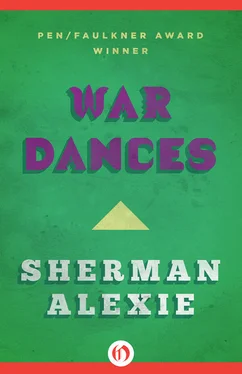Sherman Alexie
War Dances
For
Elisabeth, Morgan, Eric, and Deb
I SAW A MAN swerve his car
And try to hit a stray dog,
But the quick mutt dodged
Between two parked cars
And made his escape.
God, I thought, did I just see
What I think I saw?
At the next red light,
I pulled up beside the man
And stared hard at him.
He knew that’d I seen
His murder attempt,
But he didn’t care.
He smiled and yelled loud
Enough for me to hear him
Through our closed windows:
“Don’t give me that face
Unless you’re going to do
Something about it.
Come on, tough guy,
What are you going to do?”
I didn’t do anything.
I turned right on the green.
He turned left against traffic.
I don’t know what happened
To that man or the dog,
But I drove home
And wrote this poem.
Why do poets think
They can change the world?
The only life I can save
Is my own.
BACK IN COLLEGE, WHEN I was first LEARNING how to edit film — how to construct a scene — my professor, Mr. Baron, said to me, “You don’t have to show people using a door to walk into a room. If people are already in the room, the audience will understand that they didn’t crawl through a window or drop from the ceiling or just materialize. The audience understands that a door has been used — the eyes and mind will make the connection — so you can just skip the door.”
Mr. Baron, a full-time visual aid, skipped as he said, “Skip the door.” And I laughed, not knowing that I would always remember his bit of teaching, though of course, when I tell the story now, I turn my emotive professor into the scene-eating lead of a Broadway musical.
“Skip the door, young man!” Mr. Baron sings in my stories — my lies and exaggerations — skipping across the stage with a top hat in one hand and a cane in the other. “Skip the door, old friend! And you will be set free!”
“Skip the door” is a good piece of advice — a maxim, if you will — that I’ve applied to my entire editorial career, if not my entire life. To state it in less poetic terms, one would say, “An editor must omit all unnecessary information.” So in telling you this story — with words, not film or video stock — in constructing its scenes, I will attempt to omit all unnecessary information. But oddly enough, in order to skip the door in telling this story, I am forced to begin with a door: the front door of my home on Twenty-seventh Avenue in the Central District neighborhood of Seattle, Washington.
One year ago, there was a knock on that door. I heard it, but I did not rise from my chair to answer. As a freelance editor, I work at home, and I had been struggling with a scene from a locally made film, an independent. Written, directed, and shot by amateurs, the footage was both incomplete and voluminous. Simply stated, there was far too much of nothing. Moreover, it was a love scene — a graphic sex scene, in fact — and the director and the producer had somehow convinced a naive and ambitious local actress to shoot the scene full frontal, graphically so. This was not supposed to be a pornographic movie; this was to be a tender coming-of-age work of art. But it wasn’t artistic, or not the kind of art it pretended to be. This young woman had been exploited — with her permission, of course — but I was still going to do my best to protect her.
Don’t get me wrong. I’m not a prude — I’ve edited and enjoyed sexual and violent films that were far more graphic — but I’d spotted honest transformative vulnerability in that young actress’s performance. Though the director and the producer thought she’d just been acting — had created her fear and shame through technical skill — I knew better. And so, by editing out the more gratuitous nudity and focusing on faces and small pieces of dialogue — and by paying more attention to fingertips than to what those fingertips were touching — I was hoping to turn a sleazy gymnastic sex scene into an exchange that resembled how two people in new love might actually touch each other.
Was I being paternalistic, condescending, and hypocritical? Sure. After all, I was being paid to work with exploiters, so didn’t that mean I was also being exploited as I helped exploit the woman? And what about the young man, the actor, in the scene? Was he dumb and vulnerable as well? Though he was allowed — was legally bound — to keep his penis hidden, wasn’t he more exploited than exploiter? These things are hard to define. Still, even in the most compromised of situations, one must find a moral center.
But how could I find any center with that knocking on the door? It had become an evangelical pounding: Bang, bang, bang, bang! It had to be the four/four beat of a Jehovah’s Witness or a Mormon. Bang, cha, bang, cha! It had to be the iambic pentameter of a Sierra Club shill or a magazine sales kid.
Trust me, nobody interesting or vital has ever knocked on a front door at three in the afternoon, so I ignored the knocking and kept at my good work. And, sure enough, my potential guest stopped the noise and went away. I could hear feet pounding down the stairs and there was only silence — or, rather, the relative silence of my urban neighborhood.
But then, a few moments later, I heard a window shatter in my basement. Is shatter too strong a verb? I heard my window break. But break seems too weak a verb. As I visualize the moment — as I edit in my mind — I add the sound track, or rather I completely silence the sound track. I cut the sounds of the city — the planes overhead, the cars on the streets, the boats on the lake, the televisions and the voices and the music and the wind through the trees — until one can hear only shards of glass dropping onto a hardwood floor.
And then one hears — feels — the epic thump of two feet landing on that same floor.
Somebody — the same person who had knocked on my front door to ascertain if anybody was home, had just broken and entered my life.
Now please forgive me if my tenses — my past, present, and future — blend, but one must understand that I happen to be one editor who is not afraid of jump cuts — of rapid flashbacks and flash-forwards. In order to be terrified, one must lose all sense of time and place. When I heard those feet hit the floor, I traveled back in time — I de-evolved, I suppose — and became a primitive version of myself. I had been a complex organism — but I’d turned into a two-hundred-and-two pound one-celled amoeba. And that amoeba knew only fear.
Looking back, I suppose I should have just run away. I could have run out the front door into the street, or the back door onto the patio, or the side door off the kitchen into the alley, or even through the door into the garage — where I could have dived through the dog door cut into the garage and made my caninelike escape.
But here’s the salt of the thing: though I cannot be certain, I believe that I was making my way toward the front door — after all, the front door was the only place in my house where I could be positive that my intruder was not waiting. But in order to get from my office to the front door, I had to walk past the basement door. And as I walked past the basement door, I spotted the baseball bat.
It wasn’t my baseball bat. Now, when one thinks of baseball bats, one conjures images of huge slabs of ash wielded by steroid-fueled freaks. But that particular bat belonged to my ten-year-old son. It was a Little League bat, so it was comically small. I could easily swing it with one hand and had, in fact, often swung it one-handed as I hit practice grounders to the little second baseman of my heart, my son, my Maximilian, my Max. Yes, I am a father. And a husband. That is information you need to know. My wife, Wendy, and my son were not in the house. To give me the space and time I needed to finish editing the film, my wife had taken our son to visit her mother and father in Chicago; they’d been gone for one week and would be gone for another. So, to be truthful, I was in no sense being forced to defend my family, and I’d never been the kind of man to defend his home, his property, his shit. In fact, I’d often laughed at the news footage of silly men armed with garden hoses as they tried to defend their homes from wildfires. I always figured those men would die, go to hell, and spend the rest of eternity having squirt-gun fights with demons.
Читать дальше












